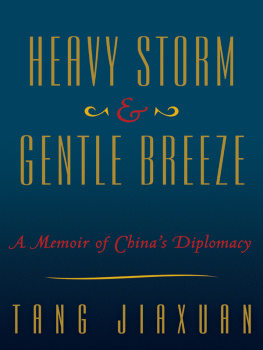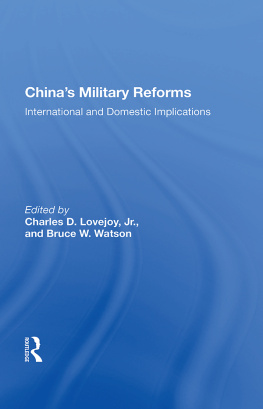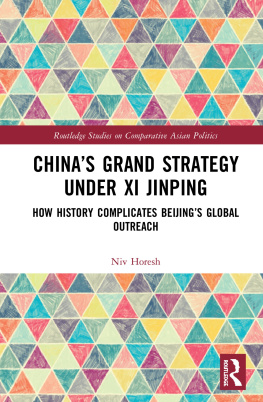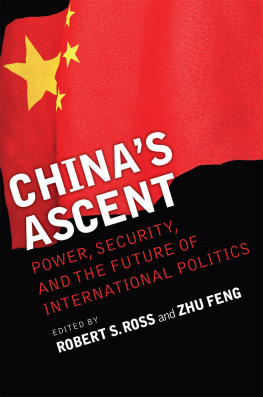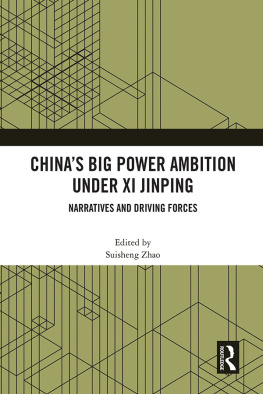INSIDE CHINAS GRAND STRATEGY
Asia in the New Millennium
Series Editor: Shiping Hua, Center for Asian Democracy, University of Louisville
This series aims to publish creative works on Asia with new materials and/or with new interpretations. We welcome manuscripts that look at the challenges and opportunities of Asia in the millennium from the perspective of politics, economics, and cultural-historical traditions. Projects that study the impact of Asian developments on the world are also welcome. Priority will be given to those manuscripts that examine the history and prospect of the democratization process of Asia. Also of our interest are those theoretically, empirically, and policy oriented works that can be used as teaching materials at undergraduate and graduate levels. Innovative manuscript proposals at any stage are welcome.
Advisory Board
William Callahan, University of Manchester, Southeast Asia, Thailand
Lowell Dittmer, University of California at Berkeley, East Asia and South Asia
Robert Hathaway, Woodrow Wilson International Center for Scholars, South Asia, India, Pakistan
Mike Mochizuki, George Washington University, East Asia, Japan and Korea
Peter Moody, University of Notre Dame, China and Japan
Brantly Womack, University of Virginia, China and Vietnam
Charles Ziegler, University of Louisville, Central Asia and Russia Far East
Books in the Series
The Future of China-Russia Relations
Edited by James Bellacqua
The Mind of Empire: Chinas History and Modern Foreign Relations
Christopher A. Ford
Challenges to Chinese Foreign Policy: Diplomacy, Globalization, and the Next World Power
Edited by Yufan Hao, C. X. George Wei, and Lowell Dittmer
INSIDE CHINAS
GRAND STRATEGY
The Perspective
from the
Peoples Republic
YE ZICHENG
Edited and Translated by
STEVEN I. LEVINE AND GUOLI LIU
Copyright 2011 by The University Press of Kentucky
Scholarly publisher for the Commonwealth,
serving Bellarmine University, Berea College, Centre College of Kentucky, Eastern Kentucky University, The Filson Historical Society, Georgetown College, Kentucky Historical Society, Kentucky State University, Morehead State University, Murray State University, Northern Kentucky University, Transylvania University, University of Kentucky, University of Louisville, and Western Kentucky University.
All rights reserved.
Editorial and Sales Offices: The University Press of Kentucky
663 South Limestone Street, Lexington, Kentucky 40508-4008
www.kentuckypress.com
15 14 13 12 11 5 4 3 2 1
Map by Dick Gilbreath
Library of Congress Cataloging-in-Publication Data
Ye, Zicheng.
[Zhongguo da zhanle. English]
Inside Chinas grand strategy : the perspective from the Peoples Republic / Ye Zicheng ; edited and translated by Steven I. Levine and Guoli Liu.
p. cm. (Asia in the new millennium)
Includes bibliographical references and index.
ISBN 978-0-8131-2645-6 (harcover : alk. paper)
ISBN 978-0-8131-2646-3 (ebook)
1. ChinaPolitics and government1976-2002. 2. ChinaEconomic policy2000- 3. ChinaForeign relations1976- 4. ChinaStrategic aspects. 5. GeopoliticsAsia. I. Levine, Steven I. II. Liu, Guoli, 1961- III. Title.
DS779.26.Y45513 2011
355.033551dc22 2010044410
This book is printed on acid-free recycled paper meeting the requirements of the American National Standard for Permanence in Paper for Printed Library Materials.
Manufactured in the United States of America.
| Member of the Association of American University Presses |
Contents
Guoli Liu and Steven I. Levine
Preface to the
English Edition
Late at night on September 20, 2008, my old schoolmate and friend Professor Guoli Liu called me from the United States with some good news. The translation of my book Inside Chinas Grand Strategy was now complete and would soon be published by the University Press of Kentucky.
After the phone call, I was very excited and could not fall asleep for a long time. I was happy as well as a bit anxious. I was happy because this edition of my book would enable more English-speaking readers to acquire a better understanding of Chinas grand strategy of peaceful development. But I was anxious because the Chinese original had been completed in 2002 and published in 2003 (with a Korean edition appearing in 2005), by now a number of years had passed, and both China and the international community had undergone some significant changes. For example, when I wrote my book, the Iraq War had not yet occurred, and, by September 2008, it had been going on for more than five years. Also, when I wrote my book, China was making numerous preparations for the Olympics, and by now the Olympics had been successfully concluded. The whole world had witnessed how the new Beijing staged a magnificent ceremony. Have the contents of my book passed the test of time? Is the point of view expressed in it already pass? Might the book mislead readers?
I have reviewed the main contents of my book several times. Happily, I am convinced that it is neither one of those works that is out-of-date before it is published nor one of those absolutely worthless and philistine works that should be immediately consigned to the remainder bins. Of course, some of the statistics cited in the book have changed a lot by now. For example, over the period 20002007, the U.S. GDP rose from $9.83 to $13.8 trillion, and U.S. military spending rose from $400 to $700 billion, and, over the period 20022007, Chinas GDP increased from $1.02 to $3.2 trillion, its per capita GDP increased from $900 to more than $2,000, and its foreign exchange reserves rose from $286.4 billion to $1.5 trillion. But the main features of Chinas grand strategy set forth in the book have not changed very much, and English-speaking readers wishing to understand Chinas situation should still find it worth reading.
The preface provides a rough sketch of the history and culture of Chinas grand strategy. In Sun Zis Art of War, in the contention between the states of Wu and Yue, in the unification of the six kingdoms by the state of Qin, as well as in other works and the course of history itself, one can discern the wisdom of Chinas grand strategy. The strategic goal of reviving the Chinese nation that was set by Mao Zedong and Deng Xiaoping has been affirmed and developed by Chinas current leaders and the Chinese people. In particular, Dengs goals of peaceful development, reform and opening, and a focus on economic development and his policies of one country two systems, establishing the rule of law, and developing the market economy remain today the core objectives of Chinas grand strategy. Now we may add to these the goals of sustainable development, the building of a harmonious society and a harmonious world, peaceful relations with its neighbors, and entering into the world community. China possesses the historical, cultural, political, and economic conditions to achieve the great project of national renascence. These conditions continue to exist. My book criticized those theories that predicted the decline or collapse of China. Such viewpoints have already been discredited and will continue to be in the future.


